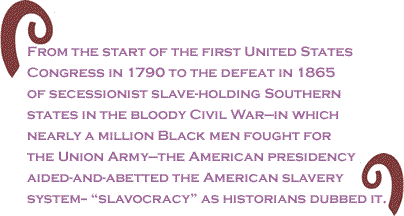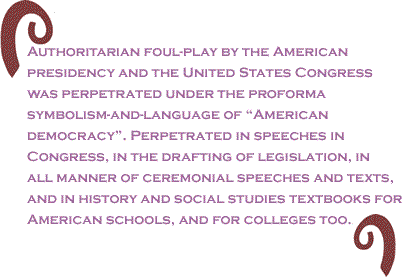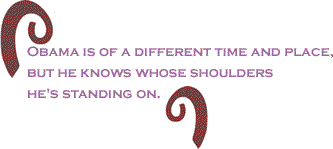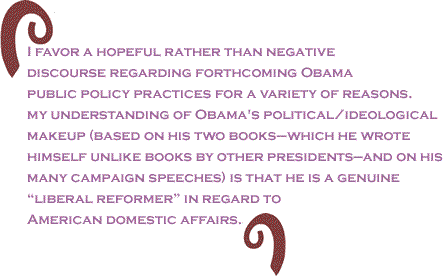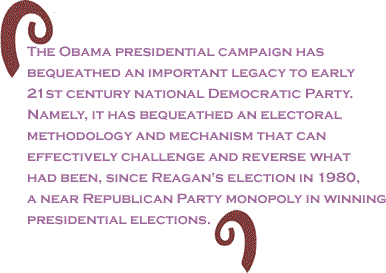
|
|||||||||||||||||||||||
| Thoughts On Barack Obama's Election To
The American Presidency |
|

Custom Search
|
|
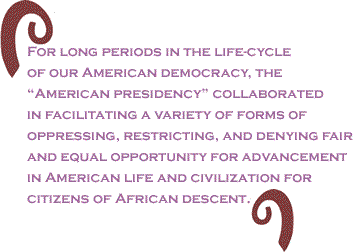 |
|
As I sit at my Laptop PC the day after the November 4th Election to pen reflections on Senator Barack Obama's historic election victory, several fundamental thoughts about the deeper meaning and significance of the results of the Election come to mind. First, that with Barack Obama's personal election victory he enters the premier position in a two-centuries old governance institution called the “American presidency”. In reflecting on Barack Obama's election as president of the United States, we should bear-in-mind that , vis-a-vis the experience of Black folks, the American presidency has been, shall we say, “a devious-and-mercurial institution”. I say “devious-and-mercurial” for very good reasons—namely, it has participated in numerous governmental processes thoroughly oppressive and restrictive toward Black people's status in American life and civilization. REMEMBER THE REACTIONARY SIDE OF THE AMERICAN PRESIDENCYFor long periods in the life-cycle of our American democracy, the “American presidency” collaborated in facilitating a variety of forms of oppressing, restricting, and denying fair and equal opportunity for advancement in American life and civilization for citizens of African descent. From the start of the first United States Congress in 1790 to the defeat in 1865 of secessionist slave-holding Southern states in the bloody Civil War—in which nearly a million Black men fought for the Union Army—the American presidency aided-and-abetted the American slavery system-- “slavocracy” as historians dubbed it. Fortunately for a brief historical period, there was an important progressive use of the American presidency as a governance institution assisting fair and equal opportunity for Black people during the great Era of Reconstruction (1865-1877). But the assassination of Abraham Lincoln and the rise of reactionary successor presidents resulted in squashing Reconstruction. Thus nefarious act of squashing Reconstruction was achieved via an intertwining of anti-Black political maneuvers in the corridors of the American presidency, on the one hand, and through all manner of political skullduggery, political authoritarianism, bureaucratic violence, and vigilante violence and terrorism—via the Klu Klux Klan and typical Southern White citizens—on the other hand. And, mind you, this blatantly authoritarian foul-play by the American presidency and the United States Congress was perpetrated under the proforma symbolism-and-language of “American democracy”. Perpetrated in speeches in Congress, in the drafting of legislation, in all manner of ceremonial speeches and texts, and in history and social studies textbooks for American schools, and for colleges too. In actual reality of course, some one-third of the then 48 states were operationally and systemically authoritarian (non-democratic that is) in relation to African-American citizens who comprised one-fifth and more of the population in many of those states.
So in that post-Reconstruction period from 1877 onward, our country witnessed a revival and refurbishment of the use of the American presidency to oppress, restrict, and deny equality of status for African-Americans. For example, neither at the governance level of the American presidency nor the United States Congress was it possible to pass federal legislation or executive-order policy to protect the life of African-American citizens from lynching, the cruelest mode of terrorist brutality against Black people. Even during the New Deal under President Franklin Roosevelt—in many respects a president warranting the appellation “great president”—federal legislation or policy outlawing lynching was not achieved. OBAMA'S VICTORY SPARKED BOTH PAIN-AND-JOYIn understanding the awful features that defined the long epoch in American history of the downside of the American presidency's relationship to Black folks, we are also able to understand a widespread aspect of Barack Obama's victory in the November 4th Election. That widespread aspect which I have in mind relates to the complex feelings experienced by perhaps millions of African-Americans following Obama's victory—namely, that two-prong feeling of both pain-and-joy. What is this pain-and-joy feeling experienced by millions of Black folks vis-à-vis Obama's victory, and experienced too by some White folks who have and-or-are multiculturalizing and cosmopolitanizing their American identity? That pain-and-joy feeling was about precisely what I discussed above. About the long season-in-hell of the American presidency's governance indifference toward the status of Black people in our American democracy. About the long epoch of the American presidency's participation in multi-generational oppression and restriction of fair and equal status and treatment for African-American citizens. Accordingly, many millions of Americans witnessed evidence of that two-prong feeling of both pain-and-joy when those television camera's at that million-plus gathering for Barack Obama's victory address on Election Night at Chicago Grant Park zeroed-in on the faces of two prominent African-American leadership personalities—Oprah Winfrey and Rev. Jesse Jackson. Those faces were strained with that strange combination of pain-and-joy. The pain was a pain of gnawing memory and recall. Recalling the vile and cruel denials of democratic and human decency to the forefathers and foremothers of Winfrey and Jackson. And thus by extension, recalling the cruel denials of democratic decency to the forefathers and foremothers of millions of other African-Americans. But the faces of Winfrey and Jackson simultaneously exhibited joy too. But not just any old everyday joy, like the joy from pop entertainment or whatever. This joy was soulful, if you will. It was joy-within-the-soul. That joy which, as in prayer, heals but heals invisibly, not visible on the outside for immediate recognition. Those awesome television shots of the faces Oprah Winfrey and Jesse Jackson on the night of president-elect Barack Obama's brilliant Election Night address at Chicago's Grant Park, were priceless evidence of the pain-and-joy among millions of Black folks-some Whites too-vis-a-vis Obama's victory.
Another variant of the pain-and-joy memory process was communicated to us by a photograph in today's New York Times (November 5, 2008). It shows a young adult African-American mother who is next to a pew in a Harlem church, her face wrenched-in-tears-and-pain. Beside her is her maybe eight-year-old daughter soothing her mother's face, offering solace and comfort. And no doubt we can reasonably extend our imaginations and assume that many at that Harlem church to witness Election Night also had faces exhibiting pain-and-joy reactions to Obama's victory. Still another newspaper photograph that I encountered was also evidence of this pain-and-joy memory process. Also appearing in today's New York Times (November 5,2008), the photograph showed two generations of African-American women, two elderly and one a young adult. As reported in the New York Times, one of the elderly women was “Rutha Mae Harris...a Freedom Singer in the '60s....” Her face strained with pain-and-joy— as was the face of the other elderly lady (the young adult woman's face was not fully visible)—Rutha Mae Harris told the reporter:
WHAT CAN/SHOULD WE ENVISION FOR THE OBAMA PRESIDENCY?Those among us African-Americans whom I view in ideological terms as “radical leftists” probably entertain not particularly positive thoughts regarding this query. Which is to say that they don't entertain expectations of solidly liberal or progressive public policy practices from the Obama presidency vis-a-vis the myriad social and economic problems facing many African-Americans—problems relating to jobs, health care, housing, and education. We readers of Black Commentator.com are familiar with articles appearing in this journal by analysts who favor negative discourse on what the Obama presidency's public policy practices might be. By contrast, as an ideologically “pragmatic leftist” I prefer to produce, in the first instance anyway, a hopeful discourse—or we might say supportive discourse—regarding the Obama presidency's forthcoming public policy practices. Why do I say this?
Second, keep in mind that the victory of Barack Obama in the November 4th Election was not just another “victorious presidential election”. By which I mean, that victory yesterday was the victory of a very particular African-American politician. Which is to say, an African-American politician whose leadership career has been shaped by the civil rights activism progressive African-American leadership legacy—the legacy of the NAACP, the NAACP Legal Defense Fund, the National Urban, the National Council of Negro Women, the Southern Christian Leadership Conference, the Children's Defense Fund, the Rainbow Coalition, so forth and so on.
Two intellectually acute reporters for the New York Times—Jackie Calmes and Megan Thee—captured this understanding of the Obama victory yesterday. They did so by astutely characterizing the several layers of what I would call “solid-liberal voter blocs” that generated the nearly 63 million popular votes for Barack Obama (62,983,132 to be precise)--some 52% of the total vote, compared with 55.7 million votes for John McCain (46% of total vote). As Calmes and Thee inform us in the New York Times (November 5, 2008):
Let me put what Calmes and Thee are telling us in the quantitative terms based on Exit Poll data. First, some 66% of 18-24 Age Voters favored Obama; 66% of 25-29 Age Voters favored Obama; and 54% of 30-39 Age Voters backed Obama. Second, 55% of women favored Obama. Third, 60% of voters earning under $50,000 annually favored Obama. Fourth, 66% of Hispanic voters favored Obama. And above all perhaps, 95% of African-American voters favored Obama. NOTE ON CENTRALITY OF BLACK VOTER BLOC IN OBAMA'S VICTORYIt is important to note in a special way the overall 95% African-American voter’s support for Obama in the November 4th Election. It happened that in major states dubbed “battleground states” by election experts, although victory in states like Pennsylvania (21 Electoral Votes), Ohio 20 Electoral Votes), Virginia (13 Electoral Votes), and North Carolina (15 Electoral Votes) depended importantly on Obama gaining something between 30% and 40% of White voters, winning these states' Electoral Vote depended perhaps even more crucially on Obama gaining two key facets of the Black voter bloc. First, the Obama campaign had to achieve what I called in earlier articles for Black Commentator “a maximal Black voter-bloc mobilization”, which fortunately it did in the “battleground states”. Secondly, the Obama candidacy had to win 90%-plus of African-American voters in “battleground states”, which Obama also achieved. On the other hand, John McCain gained a majority of White voters both overall in the November 4th Election (55% in fact, to 43% White voters favoring Obama) as well as in the key “battleground states”. Thus it was above all the maximally mobilized Black voter bloc and that voter bloc's 90%-plus support of Obama that produced, say, the 50% Obama victory in Indiana (49% McCain). It was similarly the maximally mobilized Black voter bloc and its 90%-plus support for Obama that produced the Obama 51% victory in Ohio (47% McCain). A similar Black voter-bloc pattern produced Obama's 55% victory in Pennsylvania (44% McCain), and finally this Black voter-bloc pattern resulted in Obama's 52% victory in Virginia (47% McCain).
Thus, the Obama presidential campaign has bequeathed an important legacy to early 21st century national Democratic Party. Namely, it has bequeathed an electoral methodology and mechanism that can effectively challenge and reverse what had been, since Reagan's election in 1980, a near Republican Party monopoly in winning presidential elections. For many African-Americans, they might well view this as being, in certain crucial respects, an African-American political achievement. CONCLUDING NOTE No one, of course, possesses a sooth-sayers ball of truth for projecting whether our upcoming Obama presidency—the first ever American presidency headed up by an African-American politician—will generate public policies that address the needs and mobility opportunities of not just the socially weak sectors of African-Americans, but also the socially weak sectors of White Americans, Latino-Americans, Asian-Americans, and others among our citizens. I make no pretense at all along these lines. There are, however, “good reasons” for expecting an Obama presidency, at some point in its first term, to generate a range of genuine liberal-reform public policies regarding America's domestic socio-economic affairs. Those “good reasons”, as noted above, relate partly to my understanding of the generic political-ideological makeup of president-elect Barack Obama. Those “good reasons” relate partly to Obama's linkage with the progressive African-American leadership legacy. And those “good reasons” relate, perhaps above all, to the future capacity of genuinely liberal voter-blocs among American citizens, on the one hand, and on the other hand civic-activist social movement forces. Among the latter, I have in mind civic-activist social movement forces among trade unions, women groups, church-based civic activists, activist college students, activist academics, civic activist professionals among lawyers, doctors, health professionals generally, civic-activist business persons, so forth and so on. Furthermore, I have in mind a special belief (feeling, hunch, predilection) that African-American based-and-or- influenced trade unions, women groups, church-based civic activists, activist college students, activist academics, civic-activist business persons, and civic activist professionals among lawyers, doctors, health professionals, are going to play a key role in pressuring the Obama presidency toward liberal-reform public policies. Let me conclude these hopeful ideas regarding possible liberal-reform public policy outcomes in the Obama presidency by quoting a passage from Obama's address at Chicago's Grant Park on Election Night.
Click
here
to post a comment about the election BlackCommentator.com Editorial Board member Martin Kilson, PhD hails from an African Methodist
background and clergy: From a great-great grandfather who founded
an African Methodist Episcopal church in Maryland in the 1840s;
from a great-grandfather AME clergyman; from a Civil War veteran
great-grandfather who founded an African Union Methodist Protestant
church in Pennsylvania in 1885; and from an African Methodist clergyman
father who pastored in an Eastern Pennsylvania mill town - Ambler,
PA. He attended |
|
Any BlackCommentator.com article may be re-printed so long as it is re-printed in its entirety and full credit given to the author and www.BlackCommentator.com. If the re-print is on the Internet we additionally request a link back to the original piece on our Website. Your comments are always welcome. eMail re-print notice
If you send us an eMail message we may publish all or part of it, unless you tell us it is not for publication. You may also request that we withhold your name. Thank you very much for your readership. |
|
| |
|
| November 7, 2008 Issue 298 - Election Issue |
| Executive Editor: Bill Fletcher, Jr. |
| Managing Editor: Nancy Littlefield |
| Publisher: Peter Gamble |
| Est. April 5, 2002 |
Printer Friendly Version
in resizeable plain
text format or pdf
format. |
| Frequently Asked Questions |
 |

|
 |
 |
 |
| |
| |





























